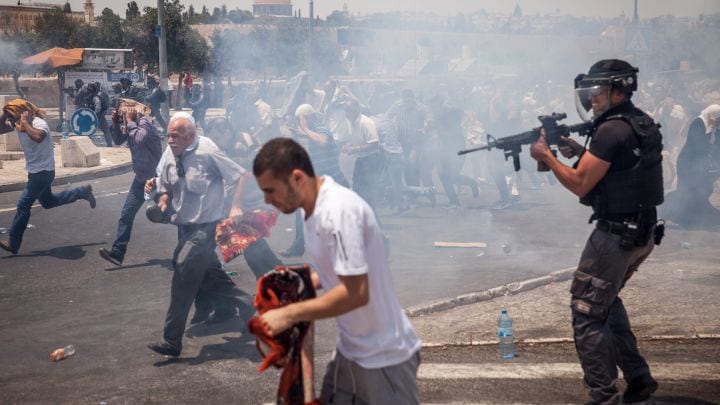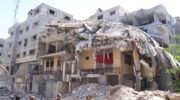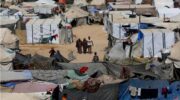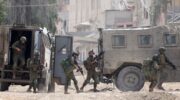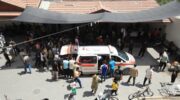Palestinian protestors and Israeli forces, East Jerusalem, July 21, 2017.
Everybody has heard about the Palestinian attack on Israeli guards in Jerusalem on Friday July 14th. Two Israeli guards were killed, three were injured and the two Palestinian attackers were killed. Some of us have heard about the two-day shut-down of Al-Aqsa mosque following the incident, the installation of metal detectors, and boycott by Muslims in protest of the metal detectors.
And today, July 21st, widespread demonstrations took place all over the West Bank: tens of thousands came to worship on the street, refusing to pass through the metal detectors as a matter of principle. Israeli security forces confronted the demonstrators, injuring close to 200 and killing three. (For comparison, note that 4 Israeli officers were wounded during the “clashes.”)
But almost nobody has heard that on Tuesday, July 18th, after the mosque complex reopened, the spiritual leader and imam of the Al-Aqsa mosque was shot.
A group gathered in the street near the entrance to the mosque complex on Tuesday night to pray. Sheikh Ikrima Sabri led the prayer, after which some worshipers stayed to protest. Israeli police used tear gas, concussion grenades, and rubber-coated steel bullets to disperse the crowd. Dozens of Palestinians were injured–including Sheikh Sabri—some seriously.

(Just an aside: rubber bullets are not as innocent as they sound—they don’t bounce off of victims. During the 2014 Ferguson unrest, there was much discussion about the use of this type of bullet. Researchers interestingly sought data from Israeli hospital records, where they found that in October 2000, 19% of 152 patients had “severe wounds,” and 3 were permanently blinded by rubber bullets. In addition, at least 20 Palestinians were killed by rubber bullets between 1987 and 1993.)
The shooting of Sabri, the highest level imam in Jerusalem, is significant–but it was left out of all mainstream media that day and every day since. Was there too much to report on, and the story was “buried”? What else happened in Israel or Palestine on Tuesday?
Mainstream media reported only one other incident. It was listed under “top stories”:
(Reuters) – “A Palestinian driver rammed his vehicle into a group of Israeli soldiers in the occupied West Bank on Tuesday and was shot dead by the troops, the Israeli military said.”
A cursory glance at local newspapers in the Palestinian territories demonstrates that it was actually a very busy news day—and not in a good way.
What else happened on Tuesday, July 18th, 2017?
Imagine being a Palestinian and seeing this going on around you:
- Israeli soldier Elor Azaria–who famously shot in the head and killed a Palestinian who was lying on the ground wounded and unarmed–was released from prison and sent home under house arrest. His 18-month sentence for this execution-style shooting (which was caught on film) was appealed for being “too harsh,” and was ordered changed to house arrest; he will be allowed to leave home to attend Sabbath services with his parents.
- Israeli bulldozers demolished a Palestinian’s home in East Jerusalem.
- More than 17 acres of private property near Bethlehem were confiscated by Israel “for military purposes.”
Tick, tick.
- Israeli settlers set up caravans on land owned by Palestinian families. The move appears to be an attempt to expand the settler outpost of Sde Boaz, which is illegal according to international law.
- Dozens of Israeli soldiers entered a hospital in occupied Jerusalem and surrounded the Intensive Care Unit that held a Palestinian boy who had been shot the previous night. It is not clear whether they took him away or are guarding him until he is feeling up to being arrested.
- Israeli soldiers invaded a town near Hebron, apparently in search for one of its residents. They broke into a number of homes and searched them; in one home, the soldiers ordered a family to to have their son turn himself in to the army by morning. Angry residents of the town threw stones and empty bottles at the army vehicles, and in turn the soldiers fired teargas and concussion grenades.
Tick, tick.
- Israeli soldiers installed a number of roadblocks around the West Bank, stopping traffic. They searched cars, interrogated Palestinians, and inspected their ID cards.
- Israeli soldiers stationed on the Gaza border fired live rounds at Palestinian homes and farmland; at the same time, tanks and armored vehicles were deployed near the border, explosives were detonated, and military drones flew overhead.
- Israeli soldiers abducted six Palestinian men at various locations around the West Bank. One of them is a journalist, another is a resident of a refugee camp.
- Overnight, twelve additional Palestinians were detained. The army added that one of its soldiers was mildly injured after Palestinian youngster hurled stones at military jeeps.
- Another man was summoned to the police station. He complied, but was abducted on his way there. Another man, a firefighter, was also abducted. Both work in the Al-Aqsa Mosque complex.
Tick, tick, tick.
Close to the brink
In any given month in 2016, Israel held 6,000-7,000 Palestinian prisoners, at times over 400 of them minors, and 500-700 of them administrative detainees. Administrative detention involves neither charge or trial. International law stipulates that, because the practice causes “substantial injury to due process,” it must be used only as a last resort; however Israeli authorities use it on a regular basis—60% of the time renewing the orders multiple times consecutively.
This laundry list of unpleasantries (no doubt incomplete) is par for the course on any given day in the Occupied Palestinian Territories, but is virtually unknown in the West. Add to it the permanent roadblocks—sometimes closed and impassable—that delay Palestinian travel to work, school, and medical treatment, the wall that separates families, the water and electricity shortages (especially severe in Gaza), and many more daily oppressive actions by Israel. In addition, Palestinians are now dealing with the shooting of Jerusalem’s spiritual leader, Sheikh Sabri (while the world looks the other way). Palestinians are being pushed closer and closer to the brink of some kind of retaliation. When that retaliation happens, it will be broadcast widely of course, and will be portrayed as if it came out of nowhere. Clearly that is not the case.
Critical condition
The Palestinian narrative must be taken seriously; their right to resistance must be recognized. Imam Sabri, who was shot on Tuesday night, is recovering now, and gave a very ominous, very significant warning:
I want to tell Israel and the world that if Israel wants peace they have to immediately remove the metal doors and other security obstacles they put in the last week…Otherwise the situation will explode and all the possibilities are open. And don’t say we didn’t tell you.
If things don’t improve quickly enough, and another intifada starts (or worse), let us remember what a day in the life of a Palestinian looks like, the pressure they endure, and their right to resist. There is only so much that we in the West can do to stop the escalation, end the injustice, and restore peace, but this much we can–and must–do:
- Read alternate news sources (like this one) and share these important news stories on social media and by word of mouth–know the facts
- Remind our representatives that Israel is breaking international law and should not continue to receive $10,000,000 a day in aid
Support BDS (Boycott, Divest, and Sanction) and urge our congressmen (both national and state) to allow people to boycott whomever they please without fear of reprisal
Kathryn Shihadah is a staff writer for If Americans Knew.
Our operations are funded solely by generous individuals like you. Your contribution will help us continue shining a light on the Israel/Palestine situation and the U.S. connection.
DONATE
RELATED: Israel-Palestine Timeline of deaths and injuries

